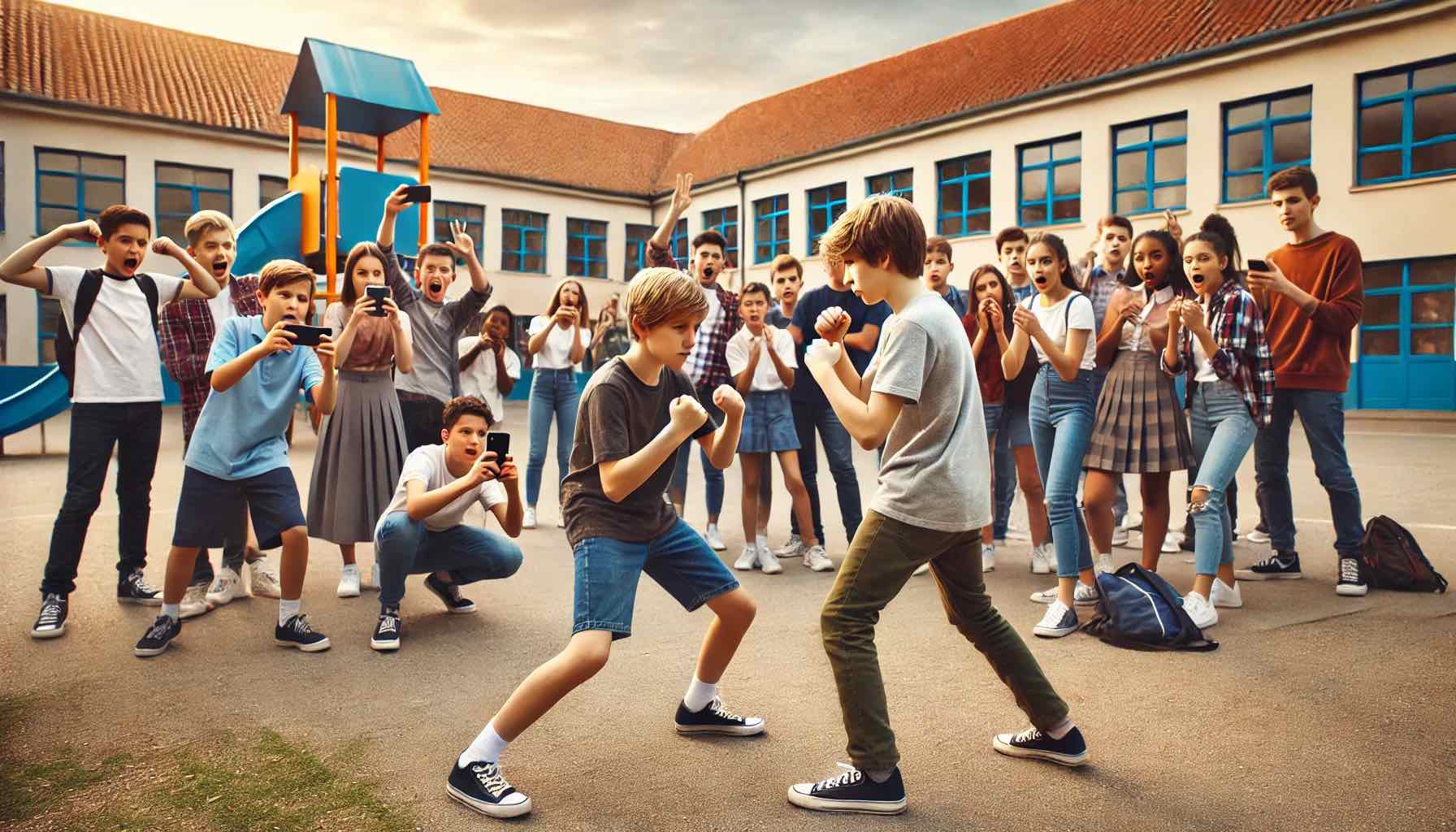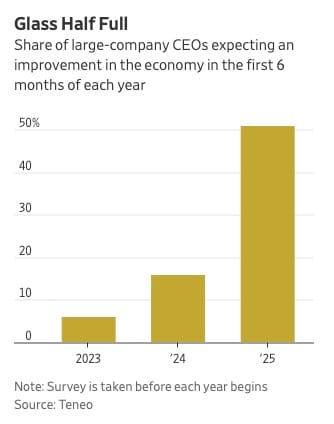December 17 2024
Dollar stores signal low income strain; School brawl epidemic; AI demands resources; CEOs upbeat for 2025; Germany early elections; First flight

1. Dollar Stores Flash Warning for Low-Income Consumers
2. Cellphone-Fueled Epidemic of School Brawls
3. AI Demands More: Data, Chips, Power, and Water
4. CEOs Optimistic About 2025 Economic Outlook
5. Germany Heads to Early Elections Amid Economic Strain
December 16, 1903: First airplane flies
See the Ad Astra Podcast! Released on Apple and Spotify around 10a CST.
1. Dollar Stores Flash Warning for Low-Income Consumers
Inflation has eased, wage growth has been decent and Americans on average still have more in savings than they used to prepandemic. Some might even say the economy has reached a much-vaunted “soft landing.” Low-income consumers, though, aren’t feeling any of that. Dollar stores, a bellwether for that group’s spending, started seeing signs of belt-tightening from their core consumers earlier this year. That trend has only continued into the latest quarter. They say their customers are waiting to shop for products at the last minute for occasions such as Halloween and spending less toward the end of the month, when their budgets are depleted. Meanwhile, cheap store brands are selling well: Dollar General said in its earnings call on Dec. 5 that its “value valley” aisle offering $1 items was its top-performing category in its last quarter. Walmart Chief Executive Doug McMillon said at a conference on Dec. 3 that the “inflationary cycle has been really detrimental” for lower-income families, noting that those customers seem to be under stress.
Article Source: WSJ
2. Cellphone-Fueled Epidemic of School Brawls
Across the United States, technology centered on cellphones — in the form of text messages, videos and social media — has increasingly fueled and sometimes intensified campus brawls, disrupting schools and derailing learning. The school fight videos then often spark new cycles of student cyberbullying, verbal aggression and violence. A New York Times review of more than 400 fight videos from schools in California, Georgia, Texas and a dozen other states — as well as interviews with three dozen school leaders, teachers, police officers, pupils, parents and researchers — found a pattern of middle and high school students exploiting phones and social media to arrange, provoke, capture and spread footage of brutal beatings among their peers. In several cases, students later died from the injuries.
Article Source: NYT
3. AI Demands More: Data, Chips, Power, and Water
It looks easy enough: Ask ChatGPT something, and it responds. But pull back the curtain, and you’ll find that every ChatGPT prompt and Microsoft Copilot task consumes vast resources. Millions of human beings engineering, correcting and training models. Enough terawatt-hours of electricity to power countries. Data center megacampuses around the world. Power line networks and internet cables. Water, land, metals and minerals. Artificial intelligence needs it all, and it will need more. Researchers have estimated that a single ChatGPT query requires almost 10 times as much electricity to process as a traditional Google search. Your typical search engine crawls the web for content that’s filed away in a massive index. But the latest AI products rely on what are known as large language models, or LLMs, which are fed billions of words of text—from the collected works of William Shakespeare to the latest forecasts of the Federal Reserve. The models detect patterns and associations and develop billions and billions of so-called parameters that help them mimic human behavior. Using these models, ChatGPT and the like create new content—hence the term generative AI. The resource-intensive nature of AI will create winners and losers. Those with the most resources will have the most advanced AI systems. It’s leading to clashes over increasingly scarce commodities, as well as access to chips. It’s motivating tech companies to seek more efficient means of developing AI. They’re throwing billions of dollars into alternative energy solutions such as nuclear fusion that have spent years if not decades sputtering along without heavy spending and technological breakthroughs. At the same time, AI’s demands are adding to the pressure to keep burning fossil fuels to feed the power grid, even as the world is on track to blow past crucial emissions targets in the fight against climate change.
Article Source: Bloomberg
4. CEOs Optimistic About 2025 Economic Outlook
CEOs of the world’s biggest companies are more optimistic about the economy than they have been in years. The enthusiasm is being driven in part by the prospect of President-elect Donald Trump’s return to the White House, with many chief executives expecting their businesses to benefit from lower corporate taxes and less regulation, according to a new survey. Outcomes of other elections around the world are also fueling expectations for improvements in the global economy and political stability. Executives are predicting a pickup in deal activity and easier access to capital in the coming months as well. Overall, 77% of chief executives said they expect the global economy will improve in the first half of next year, according to the survey of more than 300 public-company CEOs by advisory firm Teneo. That’s compared with 45% who made a similar forecast last year.

Article Source: WSJ
5. Germany Heads to Early Elections Amid Economic Strain
A. Germany is reaching a point of no return. Business leaders know it, the people in the country feel it, but politicians haven’t come up with answers. That has set Europe’s largest economy on a path of decline that threatens to become irreversible. Following five years of stagnation, Germany’s economy is now 5% smaller than it would have been if the pre-pandemic growth trend had been maintained. More worryingly, Bloomberg Economics estimates that the bulk of the shortfall will be tough to recover, due to structural blows such as the loss of cheap Russian energy and Volkswagen AG and Mercedes-Benz Group AG struggling to keep pace with China’s auto firms.
B. Germany is heading for early elections after Chancellor Olaf Scholz lost a vote of confidence, ending his fractious coalition government at a time of strain for the Eurozone’s largest economy. Scholz’s defeat by 207 to 394 votes on Monday paves the way for the dissolution of parliament ahead of the early elections pencilled in for February 23. In pre-election polling, the chancellor and his centre-left Social Democrats are behind both the opposition CDU and the far-right Alternative for Germany (AfD). “It is a project that has failed,” said Andrea Römmele, professor of communication in politics at the Hertie School in Berlin, referring to the collapse of what she described as Scholz’s “courageous” three-party coalition, the first in Germany’s post-war history. Scholz’s widely anticipated defeat in the Bundestag confidence vote sends Germany to the polls amid a darkening economic outlook, the threat of a trade war with the US and political turmoil elsewhere in Europe.
Editor's note: Germany's economic troubles stem totally from the loss of cheap Russian gas; recovery depends on restoring supply through renewed ties.
My take: US Grand Strategy: Russia
Article Source: Bloomberg, FT
December 16, 1903: First airplane flies
Near Kitty Hawk, North Carolina, Orville and Wilbur Wright make the first successful flight in history of a self-propelled, heavier-than-air aircraft on December 17, 1903. Orville piloted the gasoline-powered, propeller-driven biplane, which stayed aloft for 12 seconds and covered 120 feet on its inaugural flight.
Sources
1. https://www.wsj.com/economy/consumers/dollar-store-economic-outlook-1e1d9f9f?st=goYEib&reflink=article_copyURL_share
2. https://www.nytimes.com/2024/12/15/technology/school-fight-videos-student-phones.html?smid=nytcore-ios-share&referringSource=articleShare
3. https://www.bloomberg.com/news/features/2024-12-13/ai-wants-more-data-more-chips-more-power-more-water-more-everything
4. https://www.wsj.com/business/ceos-are-feeling-a-lot-more-upbeat-about-the-new-year-9fca7212
5. A https://www.bloomberg.com/news/features/2024-12-15/germany-is-unraveling-and-the-decline-threatens-to-become-irreversible
B https://on.ft.com/41y6bBX
